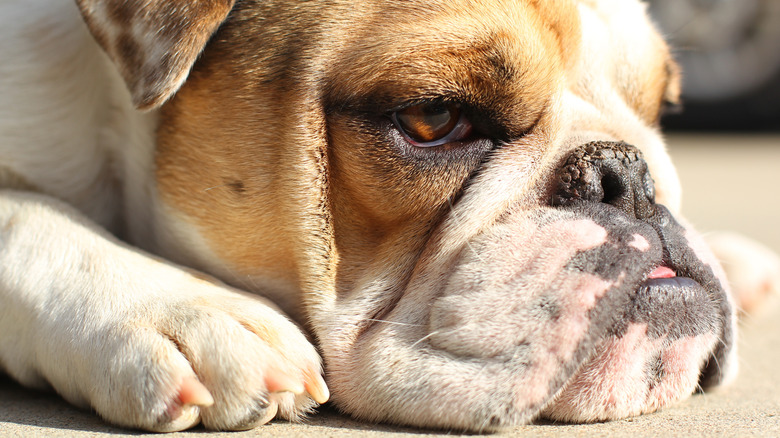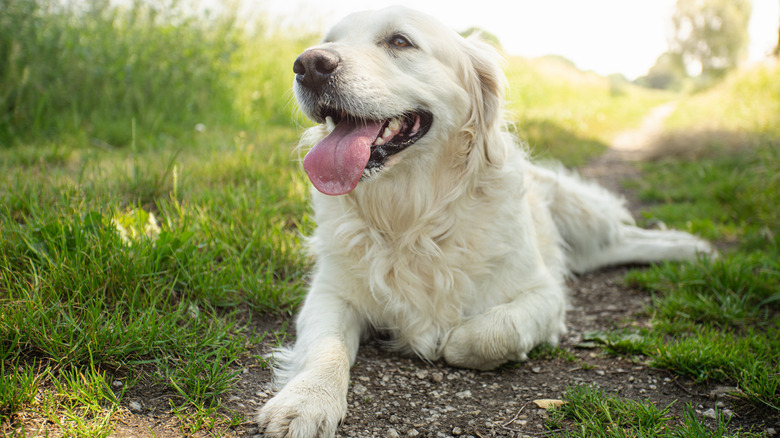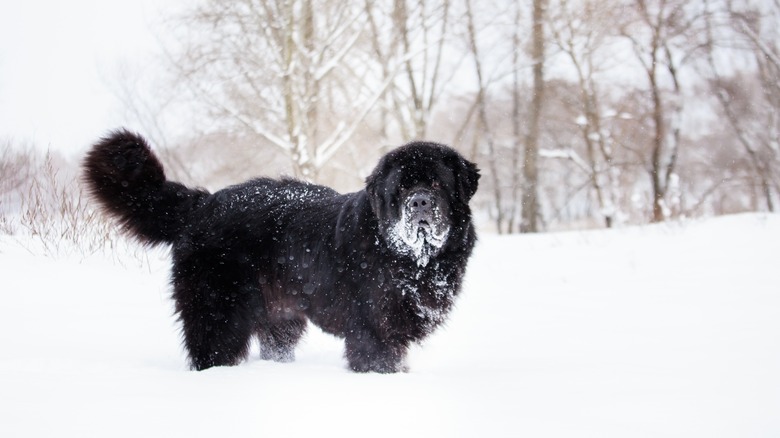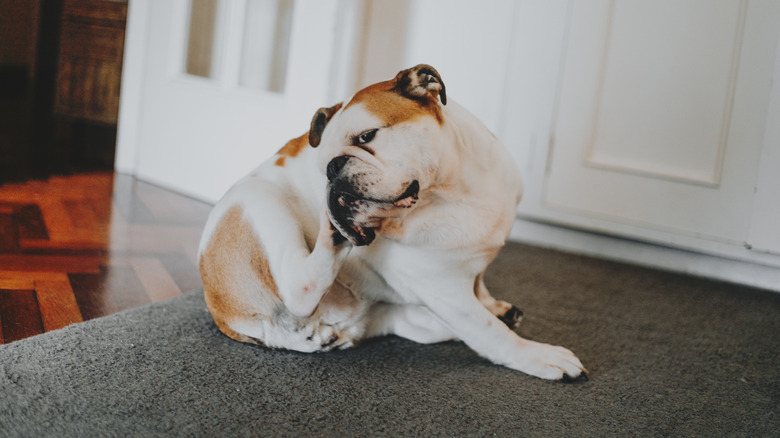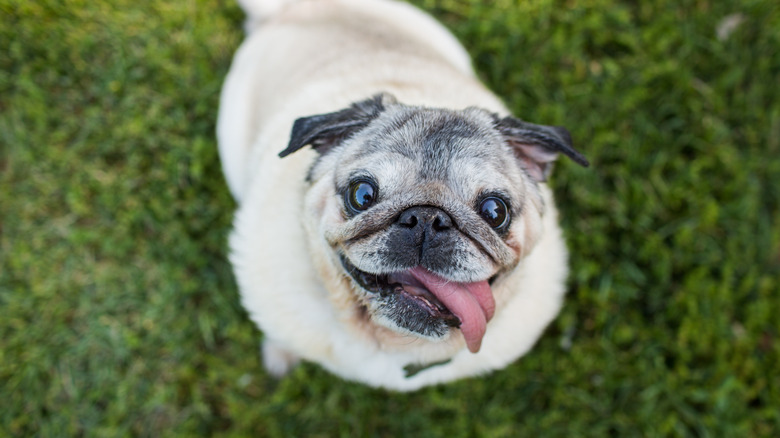What It Means If Your Dog's Nose Is Dry (And How To Fix It)
You may have noticed when your pup gives you a big ol' kiss on the face, their nose is cold and wet. Typically, this is a sign of a healthy dog. A wet nose helps our pups regulate their body temperature and enhances their sense of smell. So what if you notice that your dog's snout is drier than usual?
While you might be concerned if your dog's nose isn't the sloppy, wet one you're used to, a dry nose isn't necessarily a cause for concern. Sometimes a dry nose is the result of something as harmless as a long nap. Since dogs aren't licking their noses while they sleep, their little sniffers aren't going to be as wet as when they're awake. Other times, a dry nose can be explained by external factors like the weather conditions or allergies. In some cases, it's simply the result of their genetics.
The good news is that in most cases, a dry dog nose can be easily cured with moisturizer. However, there are certain circumstances that might require some additional treatment. Once you figure out what is causing your pooch's dry nose, you can figure out the best approach to fixing it.
Your dog is dehydrated
Dogs usually do a good job keeping their own noses moisturized by constantly licking them. However, if they become dehydrated, they won't produce as much saliva, and as a result, will either stop licking their snout entirely or hit their nostrils with a dry tongue. Dehydration in dogs can happen for a number of reasons, such as spending time outside in the hot weather, not drinking enough water, or gastrointestinal issues like vomiting or diarrhea.
Regardless of the cause, If your dog appears dehydrated, you need to get them hydrated as soon as possible. Aside from a dry nose, signs of dehydration include panting, vomiting, and dry gums, as well as a loss of appetite and skin elasticity. At this point, it could be considered a medical emergency. If your dog is showing any of these symptoms (especially after giving them water), you may need to take them to the vet to replenish lost fluids and electrolytes.
Your dog has been exposed to hot or cold weather
In the same way that human nostrils can dry out during the winter months, our fur babies' noses can also become dry and irritated after they spend time outside in extreme weather. During the winter, dogs who live in frigid temperatures can develop windburn on their noses. Thankfully, this usually isn't cause for alarm. To provide your dog with relief, consider using bag balm on your dog's nose for extra moisture and protection.
By the same token, when it's hot out, dogs' noses can become sunburnt. If you notice your pup's snout is dry and flaky after a day in the sun, there's a chance they could have gotten burned. Along with dryness, redness and blisters on the nose are some other signs of sunburn. The good news is this is totally treatable. Applying a cold compress to the snout can help your dog deal with the discomfort.
However, if the sunburn appears severe, or your pup seems to be in a lot of pain, you may want to take them to the vet to make sure they aren't suffering from a more serious condition like heat stroke. Some signs of heatstroke include excessive drooling, elevated heart rate, heavy panting, and lethargy. This can become fatal if left untreated, so if your pup is showing these symptoms, seek veterinary care immediately.
Your dog has allergies
When your pup is dealing with environmental allergies, it can lead to a variety of symptoms, including itchiness and a dry nose. Just like with humans, allergies in dogs can be triggered by exposure to certain environmental elements like pollen or ragweed. However, it's not always the outdoors that's the culprit. Certain household cleaners may contain chemicals that set off allergic reactions in your pup.
It's important to take stock of any potential irritants around your home to see if they could be causing a reaction or dry nose in your dog. Keep in mind that it may not be obvious. For instance, natural products like essential oils can be considered toxic to dogs.
Along with a dry nose, some key signs your dog may be dealing with allergies include frequent sneezing, scratching, and skin inflammation. Taking them to the vet can rule out if allergies are the culprit and if they're severe enough to warrant medication. In milder cases, you may be able to turn to home remedies to help your dog's allergies. However, some cases may require medication to manage their symptoms.
Your dog is a breed prone to dry noses
Sometimes a dry nose isn't due to an external cause. Some breeds are simply more prone to having drier noses than others, and this doesn't necessarily mean they're sick or that something is wrong. Brachycephalic breeds (a.k.a flat-faced dogs), such as pugs, bulldogs, and shih tzus, frequently have dry noses because they struggle to lick and keep them moisturized. If you have one of these pups, you'll likely need to apply nose balm or another form of moisturizer on your their nose frequently to prevent dryness. If you prefer a natural route, you can safely use cocoa butter to moisturize your dog's snout.
Another condition that can lead to dry noses that certain breeds are prone to is hyperkeratosis. Hyperkeratosis happens when your dog's body is producing more keratin than they need. Hyperkeratosis isn't a major concern, but it can lead to calluses on your dog's paws pads as well as a dry nose. Brachycephalic breeds are often prone to this condition, as well as certain others like Labrador retrievers, Irish terriers, and cocker spaniels. Applying nose balm regularly can help your dog with hyperkeratosis stay moisturized.
